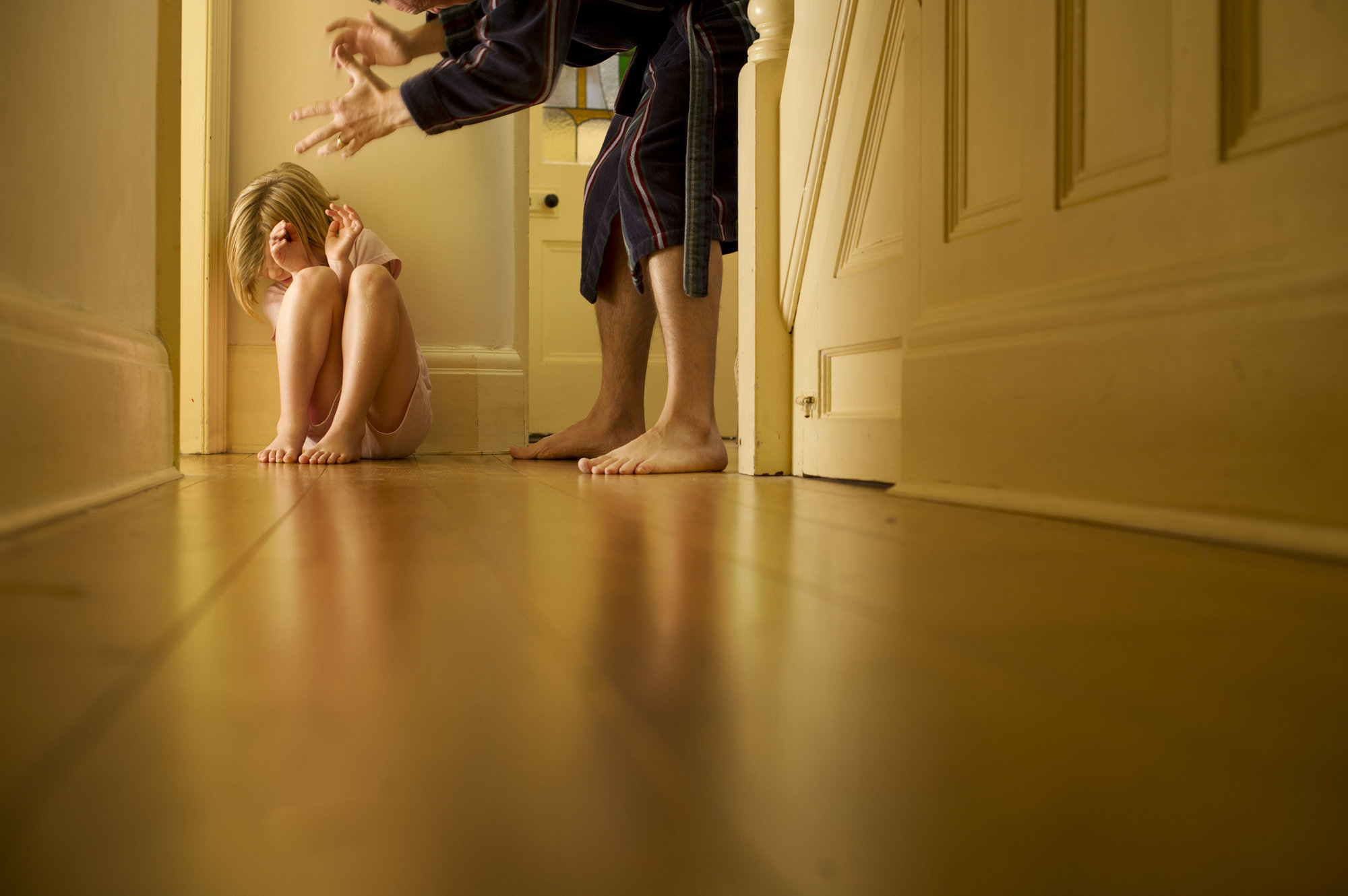
Growing up, my little sister and I had a secret hiding spot. The huge Victorian we lived in had a hollow space under the hall stairs, and we would pull out the built-in dresser drawer in our closet wall and crawl through to our quiet space. We played Barbies using a flashlight and ate snacks we'd stashed there ahead of time. But the best part about that hidden spot under the stairs was that our father and his rage were too big to crawl through the tiny opening after us.
My biological father had substance abuse and anger issues. His moods would swing in an instant from a gentle, laughing, giant tickling us on the floor to a raging bull flipping over the kitchen table because he didn't like that night's side dishes. Where most parents shield their children from R-rated movies because of the violence, mine didn't always bother. After all, I saw much worse right in my own living room.
In spite of that man and the damage he inflicted on us, I still have many wonderful memories of my childhood — playing with cousins, my mother coaching my cheer squad, days spent at the ocean. But fear was a large part of my world as a kid, an invisible third sibling that sat between my sister and me in the back seat and slept, curled and waiting, on our bedroom floor.
I worked hard to put my past behind me. With the help of a great therapist, I came to realize that what happened to us was in no way my fault — a statement that seems obvious now, but took years of hard work to be able to type. When I became a mom to twin boys five years ago, I vowed that I would give my kids the fear-free childhood I always wanted. I told myself I would never, ever, get violent with them, never raise my voice, never throw things. But it turns out being raised around domestic violence isn't an illness you recover from, it's something you carry with you always. As much as I try to fight it, my abusive childhood casts a shadow over the way I parent.
For example, sometimes when my kids are playing loudly, I find myself yelling at them to be quiet or demanding they choose a calmer activity. Rational me knows that they're not doing anything wrong — they're not playing in a way that's dangerous or doing anything other than being kids and making age-appropriate noise. But noisy play was something that commonly led to violence in my house growing up, so sometimes it makes my adult self super anxious.
Even though I'm the adult in charge now and I know I'm not going to hurt my children for simply making "Raawwr" noises while playing dinosaurs (and my husband can barely bring himself to kill bugs, let along hurt another human), in that moment it can be hard to remind myself that history's not going to repeat itself. And when I do force the boys to shut down their fun, loud activity, I beat myself up afterward over whether I'm making them think they're growing up in a house where robust play isn't welcome.
Dr. Christie Jenkins, LPCC S (OH), PC (MI) and Clinical Mental Health Counseling faculty member at Walden University says while these impulses may be frustrating, they're not uncommon for parents who were raised in a household where violence was present. "Parenting a child as an adult survivor of childhood domestic violence is a unique challenge," she explains. "Children who grow up in a home with domestic violence are more likely to be abused as well. At the very least, it prepares a parent to have an unhealthy belief system and patterns that perpetuate and/or repeat the cycle of abuse. Some parents will find themselves in an abusive relationship, while others may even strike out at those they love most in the world."
Even more upsetting than the times I can't deal with the noise are the moments when I want to yell or even lash out at my own kids. You'd think growing up witnessing and experiencing violence would make me Queen Teddy Bear. But some days when my kids are repeatedly not listening to me is when I feel myself about to lose it. Pulling back from that point can feel almost impossible.
As devastating as it to think that parents who were victims could even harbor thoughts about hitting their own kids, Jenkins says it's actually common, and not our fault. Our brains are trained to look for past experiences, or "life scripts" for clues on how to handle situations. And if your previous experiences as a child were violent or involved screaming, unfortunately, that may be an instinct the brain reaches for. "They think I would never do this to someone else," she explains. "But what happens is we play those life scripts back in our head.“ If this sounds familiar you're not a bad parent, but you will have to work hard to change how you react in those situations.
Of course, finding the time and having to means to meet with a professional therapist can be helpful to anyone who's dealing with the stress that comes with parenting after an abusive childhood. But carving out an hour each week for ourselves while dealing with work, the kids' schedules, and just plain old life in general may not be possible.
Fortunately, there are easy things parents can do to help break the cycle, simple tools to reach for that can help avoid the instinct to get physical with or yell at our own kids. "Deep breathing I think is important," says Jenkins. She also recommends using guided imagery as a way to help parents calm themselves down when they feel like they're reaching that breaking point.
She suggests we imagine a big red stop sign coming in your head when you reach your breaking point. Then remove yourself from the situation if possible and picture yourself doing something different. Try thinking about the best relaxing memory you have, like being on an island vacation.
The best part about these techniques is how they can be done anytime and anywhere. “You can breathe and use guided imagery and nobody needs to know you're doing anything at all,” she explains. My boys might giggle when they see me closing my eyes and counting my breaths, but I'd rather look silly to them than scary.
Jenkins also has some great advice to any parent who thinks they "don't have time" for self-care. "People think that seeking help is this all-encompassing piece," she explains. "But there are small, simple things you can do for yourself." Whether it's getting in a regular workout or getting up 10 minutes early to enjoy a coffee in solitude, however small, anything we do to help ourselves have a more positive, self-affirming outlook is helpful. For me, sweat therapy really works. I find I have more patience with my kids and less anxiety on the days that I hit the gym or do a workout video than the days that I don't.
"A parent [who witnessed or experienced domestic violence as a child] may harbor negative core beliefs about themselves and see the world as an unsafe or unpredictable place," says Jenkins. "They may not have adequate coping skills because they were never taught these pieces growing up. They may also believe that victimization is inevitable or normal, which leads to unhealthy family roles and boundaries."
It's true that thanks to the mistakes of my father, I'll always have to fight against the awful examples he set in order to give my own kids the better childhood they deserve. But they're worth the fight. "Children are resilient and can — with help — be the best parents that they can be," says Jenkins. "Survivors of domestic violence should not see these pieces as absolutes, but only as cautionary tales to invoke deeper understanding and healing."




